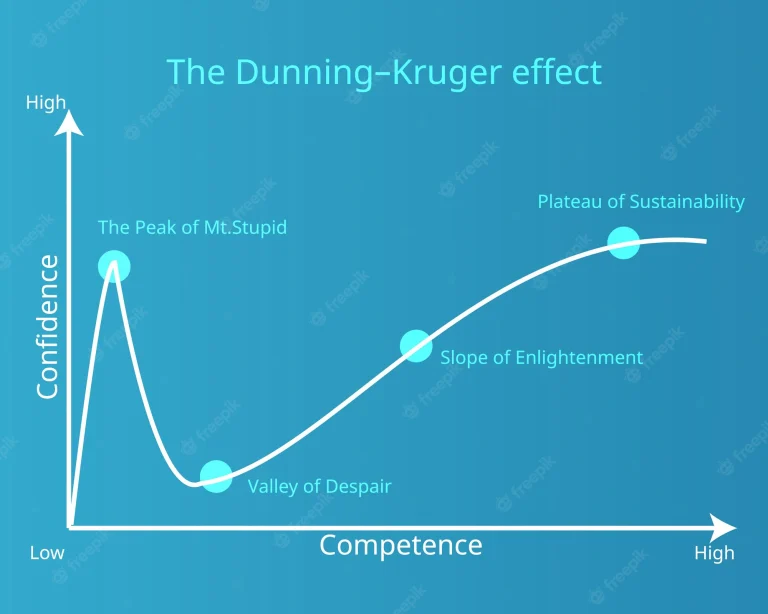If you have ever heard of the Dunning-Kruger Effect, then you may be familiar with the idea that people who lack knowledge or expertise in a certain area tend to overestimate their abilities or knowledge.
But what exactly is the Dunning-Kruger Effect, and how can you overcome it? In this blog article, we will explore the meaning of the Dunning Kruger Effect, how it works, common cognitive biases and cognitive illusions, examples of the Dunning Kruger Effect in action, how people fall victim to the Dunning Kruger Effect, strategies for overcoming the Dunning Kruger Effect, and the role of education in overcoming it.
The Dunning-Kruger Effect?
The Dunning-Kruger Effect is a cognitive bias that results from an individual’s lack of knowledge or expertise in a certain area. This bias causes them to overestimate their abilities or knowledge in that area, leading to overconfidence and erroneous assumptions.
The Dunning Kruger Effect was first identified by psychologists David Dunning and Justin Kruger in a 1999 paper titled “Unskilled and Unaware of It: How Difficulties in Recognizing One’s Own Incompetence Lead to Inflated Self-Assessments”. In their paper, Dunning and Kruger proposed that people who lacked the knowledge or expertise in a certain area were unable to recognize their own incompetence in that area, leading to an inflated view of their ability or knowledge.
Exploring the Meaning of the Dunning-Kruger Effect
The Dunning-Kruger Effect is a cognitive bias that results from an individual’s ignorance or lack of knowledge or expertise in a certain area. It causes them to overestimate their abilities or knowledge in that area, leading to overconfidence and erroneous assumptions. This cognitive bias is closely related to the concept of cognitive illusions, which are false assumptions or beliefs that are formed due to a lack of information or context.
The Dunning-Kruger Effect is a cognitive bias that results from an individual’s ignorance or lack of knowledge or expertise in a certain area.
The Dunning-Kruger Effect can manifest itself in a variety of ways. For example, an individual may overestimate their abilities in a certain area, leading them to make incorrect assumptions about their abilities or knowledge. This may lead to overconfidence, which can have a negative effect on their overall performance.
Additionally, the Dunning Kruger Effect can lead an individual to believe that they are more knowledgeable or competent than they actually are, leading them to make poor decisions or take unnecessary risks.
How Does the Dunning-Kruger Effect Work?
The Dunning-Kruger Effect works by causing an individual to overestimate their abilities or knowledge in a certain area. This can lead to overconfidence and inaccurate assumptions about their abilities or knowledge. The Dunning-Kruger Effect works by creating a false sense of confidence in an individual’s ability or knowledge in a certain area, leading them to make decisions or take risks that they are not prepared for.
The Dunning-Kruger Effect is closely related to the concept of cognitive biases, which are mental shortcuts that people take in order to make decisions more quickly. Cognitive biases can cause people to overestimate their abilities or knowledge in a certain area, leading to overconfidence and incorrect assumptions. Additionally, cognitive biases can lead people to make poor decisions or take unnecessary risks, which can have a detrimental effect on their overall performance.
Common Cognitive Biases and Cognitive Illusions
Cognitive biases are mental shortcuts that people take in order to make decisions more quickly. They can lead to overconfidence and inaccurate assumptions about a person’s abilities or knowledge in a certain area. Common cognitive biases include the confirmation bias, which is the tendency to search for, interpret, or remember information that confirms one’s preconceived notions; the availability heuristic, which is the tendency to base decisions on information that is readily available; and the anchoring bias, which is the tendency to rely too heavily on a single piece of information when making a decision.
Cognitive illusions are false assumptions or beliefs that are formed due to a lack of information or context. Common cognitive illusions include the false consensus effect, which is the tendency to overestimate the number of people who share one’s beliefs or opinions; the hindsight bias, which is the tendency to overestimate one’s ability to predict future events; and the illusory truth effect, which is the tendency to believe the information to be true simply because it has been repeated frequently.
Examples of the Dunning-Kruger Effect
One of the most common examples of the Dunning Kruger Effect is the “Lake Wobegon Effect”, which is the tendency of people to overestimate their ability or knowledge in a certain area, leading them to believe that they are better than average. This is an example of the Dunning Kruger Effect because it involves an individual overestimating their abilities or knowledge in a certain area and making incorrect assumptions about their abilities or knowledge.
Another example of the Dunning-Kruger Effect is the “Ostrich Effect”, which is the tendency of people to ignore information that could be important for making decisions, leading to incorrect assumptions. This is an example of the Dunning Kruger Effect because it involves an individual ignoring important information and making incorrect assumptions about their abilities or knowledge.
How Do People Fall Victim to the Dunning Kruger Effect?
People fall victim to the Dunning Kruger Effect when they overestimate their abilities or knowledge in a certain area. This can lead to overconfidence and incorrect assumptions about their abilities or knowledge. Additionally, people can fall victim to the Dunning-Kruger Effect when they are unaware of their own incompetence in a certain area. This can lead to an inflated view of their abilities or knowledge, leading them to make poor decisions or take unnecessary risks.
People can also fall victim to the Dunning-Kruger Effect when they are unaware of their own cognitive biases. Cognitive biases can lead to an overestimation of one’s abilities or knowledge in a certain area, leading to overconfidence and erroneous assumptions. Additionally, people can fall victim to the Dunning-Kruger Effect when they are unaware of their own cognitive illusions. Cognitive illusions can lead to false assumptions or beliefs that are formed due to a lack of information or context.
Strategies for Overcoming the Dunning-Kruger Effect
There are several strategies that can be used to overcome the Dunning-Kruger Effect. The first strategy is to be aware of one’s own cognitive biases and cognitive illusions. By being aware of one’s own cognitive biases and cognitive illusions, an individual can avoid making incorrect assumptions about their abilities or knowledge in a certain area.
The second strategy is to seek out information and feedback from others. By seeking out information and feedback from others, an individual can gain an accurate assessment of their abilities or knowledge in a certain area. Additionally, by seeking out feedback from others, an individual can gain insight into their own cognitive biases and cognitive illusions.
The third strategy is to practice self-reflection and self-criticism. By engaging in self-reflection and self-criticism, an individual can gain an accurate assessment of their abilities or knowledge in a certain area. Additionally, by engaging in self-reflection and self-criticism, an individual can gain insight into their own cognitive biases and cognitive illusions.
The Role of Education in Overcoming the Dunning-Kruger Effect
The role of education in overcoming the Dunning-Kruger Effect is to provide individuals with the knowledge and skills necessary to make accurate decisions and assessments. By providing individuals with the knowledge and skills necessary to make accurate decisions and assessments, they can gain an accurate assessment of their abilities or knowledge in a certain area. Additionally, education can provide individuals with insight into their own cognitive biases and cognitive illusions, allowing them to avoid making incorrect assumptions about their abilities or knowledge.
Education can also provide individuals with the opportunity to engage in self-reflection and self-criticism. By engaging in self-reflection and self-criticism, an individual can gain an accurate assessment of their abilities or knowledge in a certain area. Additionally, by engaging in self-reflection and self-criticism, an individual can gain insight into their own cognitive biases and cognitive illusions.
Closing Thoughts on the Dunning-Kruger Effect
The Dunning-Kruger Effect is a cognitive bias that results from an individual’s ignorance or lack of knowledge or expertise in a certain area. It can lead to overconfidence and erroneous assumptions about one’s abilities or knowledge in that area. Additionally, the Dunning-Kruger Effect can lead to poor decision-making and unnecessary risk-taking, which can have a detrimental effect on an individual’s overall performance.
Fortunately, there are several strategies that can be used to overcome the Dunning-Kruger Effect. These include being aware of one’s own cognitive biases and cognitive illusions, seeking out information and feedback from others, and engaging in self-reflection and self-criticism. Additionally, education can play an important role in overcoming the Dunning-Kruger Effect by providing individuals with the knowledge and skills necessary to make accurate decisions and assessments.
Conclusion
The Dunning-Kruger Effect is a cognitive bias that results from an individual’s ignorance or lack of knowledge or expertise in a certain area. It can lead to overconfidence and erroneous assumptions about one’s abilities or knowledge in that area. Fortunately, there are several strategies that can be used to overcome the Dunning-Kruger Effect, including being aware of one’s own cognitive biases and cognitive illusions, seeking out information and feedback from others, and engaging in self-reflection and self-criticism.
Additionally, education can play an important role in overcoming the Dunning-Kruger Effect by providing individuals with the knowledge and skills necessary to make accurate decisions and assessments.
If you find yourself falling victim to the Dunning-Kruger Effect, it is important to take steps to overcome it. By being aware of your own cognitive biases and cognitive illusions, seeking out information and feedback from others, and engaging in self-reflection and self-criticism, you can gain an accurate assessment of your abilities or knowledge in a certain area, allowing you to make better decisions and take fewer risks. Additionally, education can play an important role in overcoming the Dunning-Kruger Effect by providing you with the knowledge and skills necessary to make accurate decisions and assessments.

